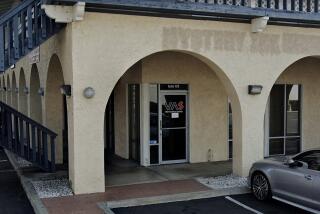Finances for the 1984 Disabled Games Are Still Tangled, an Audit Indicates
- Share via
NEW YORK — A year after the International Games for the Disabled, its finances are still in disarray.
A private accounting firm has only recently finished compiling financial and other information about the games for an audit. A public-relations firm is suing the games’ board of directors for $116,000. And Nassau County--which is planning its own audit--is worried that it won’t get back any of the $7.6 million it spent to help the games.
“Not only were the records inadequately kept,” said County Controller Peter King, “but the games board never seemed to recognize the county’s true financial interest. I’m worried we won’t get what’s left -- or anything at all. It’s disgraceful.”
During the early stages of planning for the games, which drew 1,700 disabled athletes from 45 countries for two weeks of competition in June 1984, county officials signed a contract with the International Games for the Disabled Board of Directors agreeing to help coordinate the games. The board agreed to reimburse the county for part of its expenses with any unspent funds.
The county spent $7.6 million on the games, including $4.5 million on an army of county employees who helped plan and marshal them, according to county figures. The county also spent $3.1 million on other expenses, including $2.2 million on police overtime for security.
“I don’t think anyone expected to recoup all the money,” said Deputy County Executive Owen Smith. “The games were a big success and that was primary. But we still have an interest in seeing this wrapped up fairly.”
The board of directors--volunteers with experience in sports for the disabled--has come under heavy criticism, not only from county officials, for its overall financial management of the event.
Carl Byoir Associates Inc., a public-relations firm, has sued the board for its refusal to pay about half of the firm’s $223,000 bill.
Michael Mushett, the games’ chief organizer, criticized the board for not paying its public-relations bill, as well as a $10,000 bonus promised to him. “As far as I’m concerned, Byoir did the job it was hired to do,” said Mushett, who is now working in Michigan.
Jack Weinstein, a Nassau County attorney who is treasurer and vice president of the nine-member board, refused to discuss the Byoir lawsuit.
But in discussing the finances, he blamed Mushett’s lack of organization for causing many of the financial problems that remain.
“The records were really in a shambles all along,” he said. “We had to get people to straighten them out. Mike Mushett walked out on us too soon after the games ended.”
Mushett acknowledged there was confusion during the initial stages of the games, but said it was the board’s responsibility to pay its bills. Mushett, who took a new job in September, estimated that the games took in about $3 million in donations and ticket sales, and cost about $2.7 million to operate.
According to King, accounting procedures were handled haphazardly. As the games were being staged, he assigned two employees to help Mushett set up bookkeeping controls.
Eventually, the board hired two part-time bookkeepers to piece together its financial records for a county audit. Meanwhile, the board had leadership problems because its president, William Callahan, was facing criminal charges in connection with illegal multiple billings for expenses in his job as the head of Nassau’s Board of Cooperative Educational Services. At its last meeting, in December 1984, the games board agreed to hire a private accounting firm--Peat, Marwick, Mitchell and Co.--to oversee preparation of the the records for a county audit, as well as an audit by the firm itself.
Arthur Copland, a member of the board who is involved with the U.S. Association of Blind Athletes, said he and other board members were eager for the games finances to be wrapped up and for the board to disband. “For all the members of the board, this has been a voluntary job,” said Copland. “It’s one of those things we’d all like to be done with.”
More to Read
Go beyond the scoreboard
Get the latest on L.A.'s teams in the daily Sports Report newsletter.
You may occasionally receive promotional content from the Los Angeles Times.






